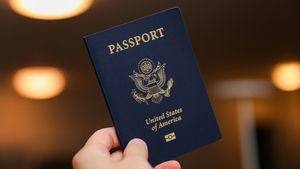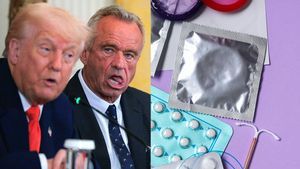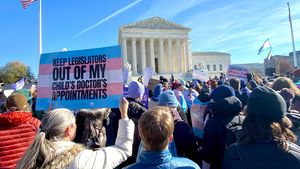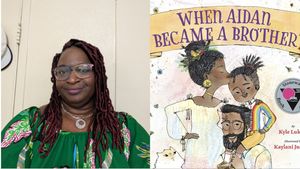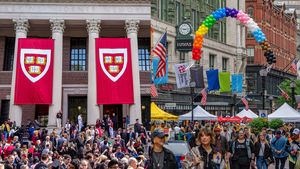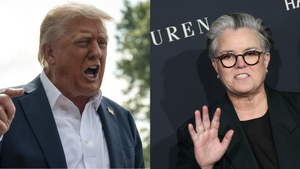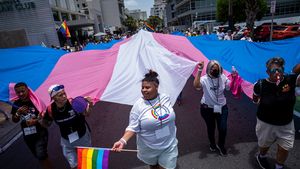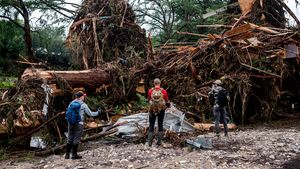"I'm the weirdest queer you're going to interview all year," says Bradford Cox, by way of his introduction. The Deerhunter frontman is sitting in his room at the Ace Hotel in Manhattan, sipping an iced coffee. He repeats the statement for emphasis, twice, pausing dramatically between each word. "Get it? The poetry of what I said?"
He's not wrong. Since 2005s Turn it Up F****t, Cox has proudly established himself as experimental rock's reigning gay weirdo. There's the unhinged performances, like his impromptu hour-long cover of "My Sharona," in response to a heckler. Or that time he smeared fake blood over his face while wearing a sundress at a performance at Mercury Lounge. Offstage, he's been just as unpredictable. He first came out as gay, then asexual, then queer; in 2016 he told Beats1 Radio: "At 34 years old, I'm actually a virgin." In his candor, he's developed a somewhat cagey reputation with the press, calling out reporters for their perceived bullshit. He's also known to deliver juicy soundbites: "That's why I decided to be gay," Cox told The Observer, "so I never have kids that love Taylor Swift."
Sitting down for this interview, on a rainy afternoon in December, I braced myself. But in a media landscape rife with canned responses, I found Cox refreshing. To speak to him is to enter a singular mind, a labyrinthine maze of free associations and cognitive leaps. He makes prolonged eye contact speaking deliberately, chewing each word. He is exceedingly lanky, a byproduct of Marfan syndrome, a genetic disorder that affects the body's connective tissue. "I've just become more isolated and more reclusive," he says, midway through our interview, pulling his knees into his chest and contracting his 6'4" frame into a ball. The effect is of an overgrown child.
Growing up in and out of hospitals in Athens, Georgia, Cox was obsessed with Edward Scissorhands. He identified with the character's otherness, and wanted to be Scissorhands when he grew up. Instead, he's committed his life to making other weirdos feel less alone.
I'm here to talk about Why Hasn't Everything Already Disappeared?, Deerhunter's eighth LP, out January 18. Cox calls its ten tracks "a science fiction album about the present." Despite its bleak title, the album is a lush panorama of sound, pushing the band further away from the avant noise rock of earlier releases towards a warmer, radio-friendly sensibility. But Cox, who also records under Atlas Sound, seems only marginally interested in talking about his own music -- in dissecting any grand meaning within his craft -- prefering to place the onus on the listener. "The reality is, whatever your response to the album is, is the truth," he says.
Instead, he's more than happy to chat about being a queer virgin, the yellow Rodarte dress he wore in Deerhunter's latest video (He wasn't a fan.), and playing Jared Leto's boyfriend in Dallas Buyers Club.
So the last I heard, you came out as asexual.
One thing I find interesting about culture today is the great search people have for an identity and what they choose to identify as. I've never identified really -- I don't choose to identify as anything, except "queer."I live an asexual lifestyle. I live an ascetic lifestyle. I don't drink, I don't do drugs. But I don't have a strong aversion to drinking except I don't like the taste of alcohol particularly so if I was sitting with you at a bar and I was forced to drink something, I would. Not to compare sexuality with alcohol, but in a way it's similar.
So an aversion to indulgence in general?
Yeah I'm ascetic. I'm far too engaged with these sorts of things: the art, literature, and music. Sexuality is really a waste of time, and so for that reason I'm often sort of just dismissed by a lot of queer culture. Because it's just sort of like, what are you doing for the queer community? Well I'm a queer. I don't need any kind of... what's the word?
Validation?
Validation. I've never needed validation. Ever since I was a child, I was queer. I've never had a problem being queer, and I grew up in a conservative religious environment. Never had any kind of guilt, never felt that I was wrong, and I've also never felt a need to complete my identification with physical acts.
Would you say your queerness is more of a gender identification rather than a sexual one?
Well I certainly don't have a strong gender identification. I feel it would be dishonest to say I'm not a cis white male you know? But my experience as a cis white male has not been in any way... normal. My physical health and my body of course has always been a contributing factor. Perhaps I'm not sexual because I associate sexuality with gore: the act of anal sex with a dilated muscle.
Oh my god.
People don't like to talk about it like that. But see I've spend a lot of time in hospitals, being penetrated by doctor's fingers and having catharters pulled out of my genitals by female nurses and a stream of blood coming out afterwards. So it's sort of like perhaps my sexuality has been altered by trauma. And of course there was trauma in terms of abuse. Not by an older person or a family member, but by a group of people my own age.
Is there ever a desire to ever get over that connotation with sex?
Well get over -- and I don't mean I'm offended by what you said -- but getting over something implies that it's my weakness. It's not that I'm not over it. I don't reflect on it very much. In fact, I only reflect on it when I'm asked about my sexuality. I think getting over things in order to engage in behavior that other people consider to be "normal" is absurd. It's just typical of modern and pre-modern civilizations goal of indoctrination, you know? Perhaps it's not that I'm not over it. Perhaps it's I'm made of experiences. Will you ever get over having glasses?
Well I wear contacts too, and I want to get Lasik at some point, but I understand what you're saying. I assume that's why a couple of years ago you told a reporter that you were a virgin at 34 years old.
I am a virgin at nearly 40 now.
Did that feel like an important thing for you to share?
I think it's important more to the people writing about it because I don't sit around thinking about my virginity. And I certainty don't find myself unable to pursue, in parenthesis, the loss of my virginity. I've never done heroin. I'm not planning on doing it at 40. I've never done cocaine. I'm not comparing sexuality to drug use but I'm just saying I have never done a lot of things. I have never driven a motorcycle up the pacific coast highway. Perhaps, one day, that opportunity will seem....
Enticing?
Not enticing, but just convenient.
One of the things I really appreciate about your presentation of queerness is that you wear it very casually, very naturally.
It is who I am. Just as much as being a balding person or being a person with Marfan's. I don't see why I should talk about Marfan Syndrome constantly. I feel the same way I do about queerness as I do about a lot of other things I have as identifying factors, which is if my talking about it can inspire pride or dignity in someone that's reading it, I will talk about it until I drop from exhaustion. But if it's just a narcissistic self-analysis for the sake of a self-promotional article about my work or something, I think it's silly. It's impossible geometry. There's so many facets to present myself. I am the most simple person I know in terms of these things. I don't have complicated past. I don't have secrets. If you ask me anything I'll tell you.
Anything?
I don't really have boundaries. In my opinion I don't need boundaries in a certain respect because I see everything I've experienced as an opportunity for someone else to feel comfort. No matter how uncomfortable those experiences make me. Patti Smith, who was once a great hero of mine -- I just don't have heros anymore, it's not that she's lessened in my amount of respect -- but she once said "Those who've suffered understand suffering and thereby extend their hand." I may be butchering that, but my ultimate artistic or life goal is to embody that.
You've explored expressions of queerness through fashion, like wearing dresses during performances, or in Deerhunter's last video for "Death in Midsummer."
Well the dress in the last video I did not enjoy. I just don't like prints. It was a favor to the photographer. She had been given that dress I think by Rodarte.
I thought it was beautiful.
A lot of people loved the dress. And I love the ladies of Rodarte. You know, I just don't think yellow suits me. And I love yellow and I love to use bits of yellow, but I don't think an overall yellow dress suits me. And also I just found the cut to be a bit -- I like things that are much more minimal. It's a little bit summer and I'm more of an autumn.
You've once said, "The dress thing, it's my idea of rock. Kurt Cobain, even though he was straight, he made a lot of gay kids feel an inch closer to acceptance. And he did that by challenging gender images."
I had a dream about Kurt Cobain a few months ago. I just remember saying in the dream "You're just a kid." If I met him today -- I mean I'm 10 years older than him when he passed...
He was in the 27 Club right?
Yeah, I mean I'm far more refined in my identity and tastes now than I was then. God I was wearing awful flannels on stage. And jeans.
Boot cut. It was a different era.
It was a different era, but it was also a different awareness because there's been so many eras in which things have looked so much better. In the dream I found myself berating Kurt Cobain, saying "Get over these things man. You're 27 years old. I'm ten years older than you."
What was it like being in Dallas Buyers Club?
I played Jared Leto's lover.
How did that happen?
You know I don't know how it happened. I didn't pursue it. It was just "Would you come and do it?" They were all so friendly and nice to me and they were all great people. Jared was always in character, so I never actually talked to Jared Leto. The reality is my involvement was completely improvised, completely random. It was a cool experience. I would like to do more acting but I would like to act in a more formalist... I would have loved to be in a Fassbender film. I would very much not like to only be asked to play one sort of character.
Were you offended at all by being cast as that character?
No. Because I love who that character's based on. What I mean by that is I'd rather play a character that's marginalized or ill or something. I certainly don't want to play someone with good teeth. That would be the one thing I couldn't do, you know?
I do want to talk about the new album. It's been almost four years. Tell me about some of your ideas, thoughts, experiences between now and then.
I've just become more isolated and more reclusive. Not in a wanton way -- it's just been age. I see it the same in Manhattan, or LA, or Tokyo, or England. It doesn't really matter where you are or how much culture is around you, the older you get the more you want to stay home with your dog or your family or whatever. So I've just spent a lot of time in what I would call deep ascetic contemplation. My bandmates are not queer and have families and then there's marriages, divorces, loss. A time of a lot of upheaval and chaos. My response to this kind of stuff is to retreat further into my own home, which is my sanctuary. It's mine. It's just me and my dog. It's an old Victorian bungalow in Atlanta situated across a park, on a city street. And my house is very high up on a hill overlooking the park so I feel like I'm in a treehouse. I nest. It's very much a nesting sort of thing.
You recorded some of this record in Marfa. Did being in the desert influence your approach to sound?
Frankly, there's an artistically interesting answer and there's the reality answer. The reality answer is the album was written before I had even gotten onto the plane. Did the air and the sound of total silence at night have an influence? I would say maybe. It certainly seeped in there. There's a lot of rabbits in Marfa. I don't think they were regular rabbits. Cate [Le Bon] was calling it Welsh or something like that. I don't know. They're sort of feral street rabbits.
You've described the album "as a science fiction album about the present."
Yeah I was reading a lot of science fiction and I have for years. It's something I'm fascinated by. British new wave science fiction: they all sort of try to find something very uncanny and eerie in the brutalist architecture of their time. I think there's a J.G. Ballard collection called "Myths of the Near Future." I liked that about science fiction. At the time it was written they were writing about the future, and suddenly it got a lot closer to the present. Just a few years from now there was this uncanny feeling. When you look around it's desolate and culture is at a really low point.
Do you have any queer mentors in music?
Well Michael Stipe has always been a great friend of mine and I've come to him for personal advice. Anyone can tell you who knows Michael is that when he gives you personal help and advice he's suddenly not Michael Stipe. He's an incredible friend. Very empathetic.
Do you ever feel the responsibility to be a queer role model?
I think in our culture things are moving too fast for their to be someone. Longevity is very rare. I feel like I've achieved a certain amount of longevity, so I think if I was a role model to just a very small number of people that's an extreme honor. I'm far too mercurial to appeal to a large group of disenfranchised people. And I wouldn't want the responsibility either.

































